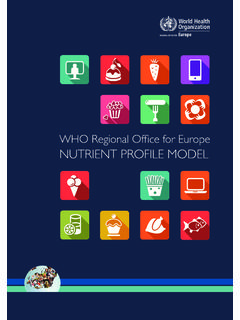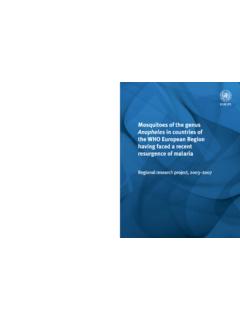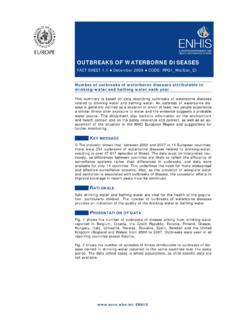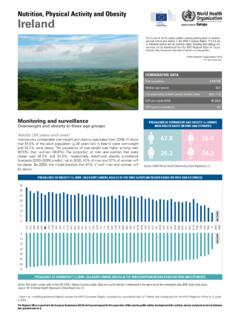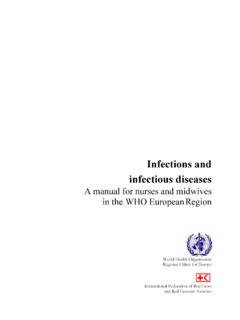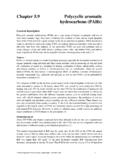Transcription of Health Promoting Universities - World Health Organization
1 World Health Organization Regional Office for Europe Copenhagen Health Promoting Universities Concept, experience and framework for action Edited by Agis D. Tsouros, Gina Dowding, Jane Thompson & Mark Dooris 1. ISBN 92 890 1285 4 EUR/ICP/CHVD 03 09 01. 1998 ENGLISH ONLY. EDITED. TARGET 14. SETTINGS FOR Health PROMOTION. By the year 2000, all settings of social life and activity, such as the city, school, workplace, neighbourhood and home, should provide greater opportunities for Promoting Health . Abstract Institutions of higher education have long been concerned about Promoting Health among students. The settings-based approach to Health promotion can potentially enhance the contribution of Universities to improving the Health of populations and to adding value in the following ways: 1) by protecting the Health and Promoting the wellbeing of students, staff and the wider community through their policies and practices, 2) by increasingly relating Health promotion to teaching and research and 3) by developing Health promotion alliances and outreach into the community.
2 This working document provides conceptual and practical guidance on how to set up and develop a Health - Promoting university proj- ect. It combines a series of innovative case studies from the United Kingdom and the outcome of a WHO round table meeting on the criteria and strategies and operational attributes of the Health Promoting Universities project and an action framework for a European Network of Health Promoting Universities . Keywords Universities . Health PROMOTION. PROGRAMME DEVELOPMENT. PUBLIC Health trends SUSTAINABILITY. Health FOR ALL. HEALTHY CITIES. EUROPE. Cover design: Graphic design consultants: Matthew J. Sumbland Rowland & Hird, Lancaster, United Kingdom World Health Organization All rights in this document are reserved by the WHO Regional Office for Europe. The document may nevertheless be freely reviewed, abstracted, reproduced or translated into any other language (but not for sale or for use in conjunction with commercial purposes) provided that full acknowledgement is given to the source.
3 For the use of the WHO emblem, permission must be sought from the WHO Regional Office. Any translation should include the words: The translator of this document is responsible for the accuracy of the translation. The Regional Office would appreciate receiving three copies of any translation. Any views expressed by named authors are solely the responsibility of those authors. 3. This document was text processed in Health Documentation Services WHO Regional Office for Europe, Copenhagen Contents Page i Foreword .. iii Introduction .. 1. Agis D. Tsouros 1. Context The historical shift in public 5. John Ashton From the healthy city to the healthy university: project development and Agis D. Tsouros The settings-based approach to Health promotion ..21. Mark Dooris, Gina Dowding, Jane Thompson & Cathy Wynne 2. Health and higher education Universities and Health in the twenty-first century ..33. Nicholas Abercrombie, Tony Gatrell & Carol Thomas A common agenda?
4 Health and the greening of higher Peter Toyne & Shirley Ali Khan 3. Case studies Action learning for Health on campus: muddling through with a model? University College of St Martin, Alan Beattie Creating a healthy medical school University of Newcastle ..57. Martin White 5. Public Health education for medical students: a problem-based curriculum and new opportunities University of Liverpool ..69. Gillian Maudsley Embracing organizational development for Health promotion in higher education Lancaster University ..77. Gina Dowding & Jane Thompson The healthy university within a healthy city University of Camilla Peterken The university as a setting for sustainable Health University of Central Lancashire ..105. Mark Dooris 4. The way forward Strategic framework for the Health Promoting Universities Agis D. Tsouros, Gina Dowding & Mark Dooris A framework for action by a European Network of Health Promoting Agis D. Tsouros & Gina Dowding Glossary of terms related to higher education and the Health care system in the United Preface Universities can do many things to promote and protect the Health of students and staff, to create Health -conducive working, learning and living environments, to protect the environment and promote sustainability, to promote Health promotion in teaching and research and to promote the Health of the community and to be a resource for the Health of the community.
5 The challenge is to develop Health - Promoting university projects that encourage all these aspects. There is considerable enthusiasm for and interest in the concept of the Health - Promoting university. Demand for guidance is also growing. This is a working document that explores, visualizes and develops the Health - Promoting potential of Universities using the settings-based approach to Health promotion. The development of the strategic framework for Health - Promoting university projects and networks has drawn on a number of sources: ex- pertise developed by the WHO Healthy Cities Project Office; the experi- ence of Health - Promoting university ongoings, especially those at Lan- caster University and the University of Central Lancashire in England; the experiences of other settings-based projects, such as Health Promoting Schools and Health Promoting Hospitals; the ideas and papers presented at the First International Conference on Health Promoting Universities in Lancaster, England in 1996; and the WHO round table meeting on the criteria and strategies for a new European Network of Health Promoting Universities in 1997.
6 The commitment and active engagement of senior university ex- ecutives is essential to the success of Health - Promoting university proj- ects. I am therefore delighted that two inspired and committed vice- chancellors (rectors) in the United Kingdom have endorsed this docu- ment. I would like to express my gratitude and appreciation to Gina Dow- ding for her valuable contribution as the principal technical adviser in drafting the papers on strategy and in the preparation of this book. Many thanks are also due to Mark Dooris and Jane Thompson, the other two co- editors of the book, for their input. Appreciation and many thanks are due to the following people whose initial commitment to the idea of the i Preface Health - Promoting university enabled this document to become reality: John Ashton (NHS Executive Office North West), Aislinn O'Dwyer (NHS Executive Office North West), Tony Gatrell (Lancaster Univer- sity Institute for Health Research), Sarah Andrew (Lancaster Univer- sity Department of Biological Sciences) and Cathy Wynne (More- cambe Bay Centre for Health Promotion).
7 A special word of thanks goes to Dominic Harrison, English Health Promoting Hospitals Na- tional Network Coordinator, for his support. I thank Birgit Neuhaus for valuable editorial assistance. Many thanks to David Breuer for im- proving the language and the style of the book. Agis D. Tsouros Regional Adviser for Urban Health Policies Coordinator, Healthy Cities project Head, Urban Health Centre WHO Regional Office for Europe ii Foreword We are very pleased to endorse this book, which provides a timely in- troduction to the concept and practice of the Health - Promoting univer- sity. Lancaster and Central Lancashire were two of the very first Universities in Europe to establish Health - Promoting university projects. Though very different Lancaster is an old university, whereas Central Lancashire is a new university, and Lancaster is a campus university some five kilometres from the city, whereas Central Lancashire is situated in the heart of the town of Preston the processes involved in setting up and developing the projects have had many similarities.
8 These are reflected in the case studies later in the document. Both situated in the north-west of England, the two Universities have been well placed to exchange ideas and experiences. This collaborative approach to the development of good practice has been a refreshing expression of the projects' underlying principles within an increasingly competitive environment. The heart of any Health - Promoting university initiative must be a top-level commitment to embedding an understanding of and com- mitment to sustainable Health within the Organization in its entirety. This means a number of things. As large institutions, Universities can build a commitment to Health into their organizational culture, structures and practices . creating supportive working, learning and living environments. As major employers, Universities can promote staff wellbeing through appropriate management, communication and opera- tional policies. As creative centres of learning and research, Universities have the potential to develop, synthesize and apply Health -related knowl- edge and understanding.
9 As educators of future generations of decision-makers, universi- ties have the potential to develop a critical understanding of sus- iii Foreword tainable Health and a sense of personal and community steward- ship which will affect society at large. As settings within which students become independent, universi- ties have both a responsibility and the potential to enable healthy personal and social development. As a resource for and a partner in local, national and global com- munities, Universities have a crucial role in advocating and medi- ating for healthy and sustainable public policy. As the twenty-first century approaches, Universities occupy a unique position in society, drawing on a rich educational and cultural heritage, while being at the cutting edge of technological and other innovative developments. As such, they are ideally placed not only to be part of the part of the exciting and expanding movement for Health - Promoting settings but also to provide a testing ground for critically applying, evaluating and further developing this approach.
10 Brian Booth Bill Ritchie Vice-Chancellor Vice-Chancellor University of Central Lancashire Lancaster University Preston Lancaster England England United Kingdom United Kingdom iv Introduction Agis D. Tsouros Universities committed to the principles of Health for all and sustain- able development can be a tremendous asset to their staff and students, to the communities in which they are located and to the wider society where their students and trainees will eventually assume professional roles. This is a working document that explores, visualizes and develops the Health - Promoting potential of Universities . It aims to provide con- ceptual and practical guidance on how to set up and develop a Health - Promoting university project. Many people intuitively understand the concept of a Health - Promoting university. The meaning, however, the scope and focus of university actions aiming at Promoting Health , can vary widely. This variation can be partly explained by differences in the perception of Health and its determinants and partly by the inter- ests, strategic choices and the power and authority of the Health advo- cates for the university.

